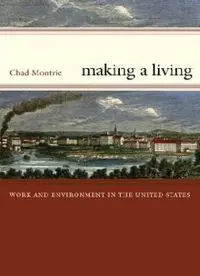
Making a Living: Work and Environment in the United States PDF
Preview Making a Living: Work and Environment in the United States
making a living Chad Montrie The University of North Carolina Press * Chapel Hill Making a Living work and environment in the united states ∫ 2008 the university Library of Congress Cataloging-in- of north carolina press Publication Data All rights reserved Montrie, Chad. Set in Carter + Cone Galliard Making a living : work and environment in by Keystone Typesetting, Inc. the United States / by Chad Montrie. Manufactured in the United States p. cm. of America Includes bibliographical references and index. The paper in this book meets the guide- isbn 978-0-8078-3197-7 (cloth: alk. paper) lines for permanence and durability of isbn 978-0-8078-5878-3 (pbk.: alk. paper) the Committee on Production Guide- 1. Labor—United States—History. lines for Book Longevity of the Council 2. Environmentalism—United States— on Library Resources. History. I. Title. hd8072.5.m66 2008 Portions of this book are based on previously 331.0973—dc22 published articles: ‘‘Continuity in the Midst 2007044718 of Change: Work and Environment for West Virginia Mountaineers,’’ West 12 11 10 09 08 5 4 3 2 1 Virginia History 1 (Spring 2007): 1–22; ‘‘ ‘Men Alone Cannot Settle a Country’: Title page illustration: J. W. Barber, Domesticating Nature in the Kansas- ‘‘East View of Lowell.’’ Courtesy of the Nebraska Grassland,’’ Great Plains Center for Lowell History, University of Quarterly 25 (Fall 2005): 245–58; ‘‘ ‘I Think Massachusetts Lowell. Less of the Factory Than of My Native Dell’: Labor, Nature, and the Lowell ‘Mill Girls’,’’ Environmental History 9 (April 2004): 275–95. Used by permission of the publishers. For Bob Foreman This page intentionally left blank Contents Acknowledgments * ix Introduction * 1 1. I Think Less of the Factory Than of My Native Dell * 13 Labor, Nature, and the Lowell Mill Girls 2. Living by Themselves * 35 Slaves’ and Freedmen’s Hunting, Fishing, and Gardening in the Mississippi Delta 3. Men Alone Cannot Settle a Country * 53 Domesticating Nature in the Kansas-Nebraska Grasslands 4. Degrees of Separation * 71 Nature and the Shift from Farmer to Miner to Factory Hand in Southern West Virginia 5. A Decent, Wholesome Living Environment for Everyone * 91 Michigan Autoworkers and the Origins of Modern Environmentalism 6. A Landscape Foreign and Physically Threatening * 113 Southern California Farmworkers, Pesticides, and Environmental Justice Conclusion * 129 Notes * 133 Bibliography * 159 Index * 173 This page intentionally left blank Acknowledgments As is always the case with a book, I could not have written this one but for the support, assistance, patience, and good humor of many di√erent people. I now have been privileged to work with Sian Hunter at the University of North Carolina Press on two separate projects. This time around, like before, she helped me broaden the scope of my research and deepen my interpreta- tion. Anonymous readers also provided several sets of reviews that challenged me to make critical, necessary changes. And other sta√ at unc Press, includ- ing Nathan McCamic, Paul Betz, Ellen Bush, and Liz Gray, were models of professional competence when it came to an appraisal, copy editing, and all the additional, important steps along the road to publication. The archival research for this book was generously funded by the History Department, Division of Social Sciences and Humanities, and Provost’s Of- fice at the University of Massachusetts Lowell. I received one of the univer- sity’s Healey Grants, as well, and an O≈ce of Research Administration/ Scholarly Research Forum Grant, which allowed me to make one last trip to Detroit. Archivists at the Center for Lowell History, National Archives, Kan- sas State Historical Society, West Virginia University, and Walter Reuther Library at Wayne State University were kind and knowledgeable, especially Martha Mayo, a walking trove of Lowell history. For articles, books, and various primary sources acquired through interlibrary loan and virtual cata- logue, I relied on the diligent labors of Rose Paton and Debbie Friedman. My dual interest in labor and environmental history was first nurtured at the University of Louisville, where I had the good fortune as an undergradu- ate to be mentored by John Cumbler. Taking his courses and engaging him in many conversations outside of class convinced me that the two fields could and should be brought together. I also received early encouragement for the endeavor from the late Hal Rothman. In his last year as editor at Environmen
